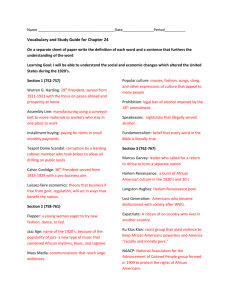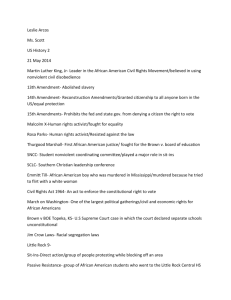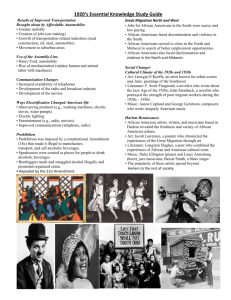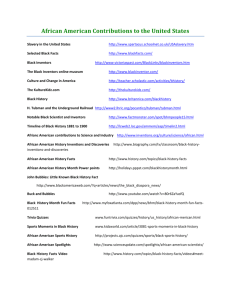Trials, Triumphs, and Trailblazers: Historic Women in African
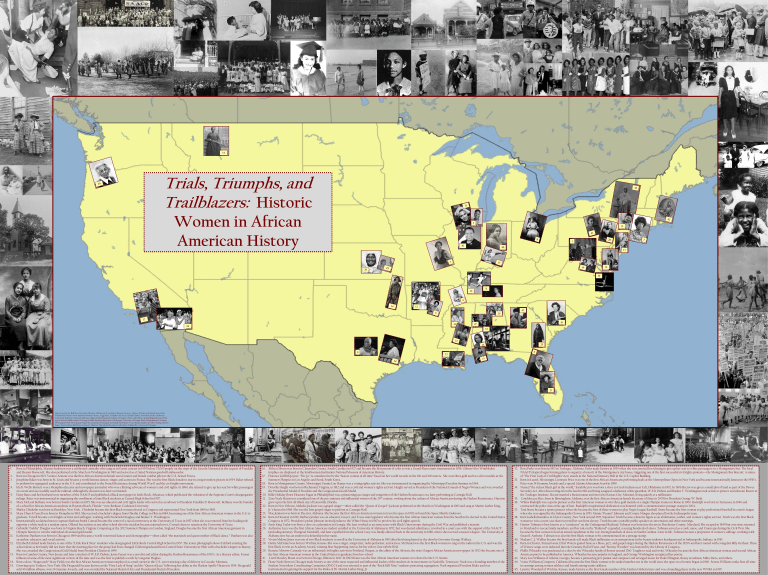
14
Trials, Triumphs, and
Trailblazers: Historic
Women in African
American History
44
9
28
12
2
30
40
22
36
31
18 27
32
26
43
25
16
1
10
39
15
13
21
Map created by the Ball State University Libraries’ GIS Research and Map Collection. Sources: A History of Women in the United States, Doris
Weatherford; Women’s Firsts: Milestones in Women’s History, Peggy Saari, Timothy Gall, Susan Gall (Ball State University Libraries’ Reference
Collection); Ball State University Libraries’ Digital Media Repository; Library of Congress Prints and Online Catalog; Biography.com (Web page); National Public Radio (Web page); Public Broadcasting Service (Web page); University of Georgia; Black Entertainment Television
(Web page); ESPN (Web page); Oregon Encyclopedia (Web page); Searching for Sarah Rector, Tonya Bolden; Madam C.J. Walker: Building a Business
Empire, Penny Colman (Ball State University Libraries’ Educational Resources Collection); Wikimedia Commons (Web page).
1.
Born in Philadelphia, Marian Anderson was a celebrated contralto who sang at an Easter concert in 1939 before 75,000 people on the steps of the Lincoln Memorial at the request of Franklin and Eleanor Roosevelt. She also performed at the March on Washington in 1963 and served as a United Nations goodwill ambassador.
2.
Born in Chicago in 1973, Vernice Armour was the first African American female naval aviator and female combat pilot in the U.S. Armed Forces.
3.
Josephine Baker was born in St. Louis and became a world famous dancer, singer, and actress in France. She was the first Black female to star in a major motion picture in 1934. Baker refused to perform for segregated audiences in the U.S. and contributed to the French Resistance during World War II and the civil rights movement.
4.
Ida B. Wells-Barnett was a Memphis educator and newspaper journalist who was a lifelong advocate of women’s and civil rights. In 1884, she refused to give up her seat for white passengers on a train and successfully sued the railroad, although the decision was later overturned.
5.
Daisy Bates and her husband were members of the NAACP and published a Black newspaper in Little Rock, Arkansas, which publicized the violations of the Supreme Court’s desegregation rulings. Bates was instrumental in organizing the enrollment of nine Black students at Central High School in 1957.
6.
Mary McLeod Bethune was born in South Carolina in 1875. She was an educator and civil rights leader who served as an advisor to President Franklin D. Roosevelt. Bethune was the founder of a school for African American students in Daytona Beach, Florida—now Bethune-Cookman University.
7.
Shirley Chisholm was born in Brooklyn, New York. Chisholm became the first Black woman elected to Congress and represented New York from 1969 to 1983.
8.
Mary Church Terrell was born in Memphis in 1863. She received a bachelor’s degree from Oberlin College in Ohio in 1884, becoming one of the first African American women in the U.S. to graduate. Terrell became a civil rights activist and suffragist, working with Frederick Douglass and Booker T. Washington.
9.
Internationally acclaimed mezzo-soprano Barbara Smith Conrad became the center of a racial controversy at the University of Texas in 1957 when she was removed from her leading role opposite a white male in a student opera. Offered free tuition at any other school after the incident became national news, Conrad chose to remain at the University of Texas.
10. Gabrielle “Gabby” Douglas was born in Virginia Beach, Virginia. Competing at the 2012 Summer Olympics in London, England, Douglas became the first African American gymnast in
Olympic history to win the individual all-around gold medal.
11. Katherine Dunham was born in Chicago in 1909 and became a world-renowned dancer and choreographer—often called “the matriarch and queen mother of Black dance.” Dunham was also an author, educator, and social activist.
12. Elizabeth Eckford made history as one of the “Little Rock Nine” students who desegregated Little Rock Central High School in 1957. The iconic photograph shows Eckford entering the school alone as her family did not learn that the meeting place for the group had been changed. Eckford graduated from Central State University in Ohio with a bachelor’s degree in history.
She was awarded the Congressional Gold Medal from President Clinton in 1999.
13. Born in Camden County, New Jersey and later a student of W.E.B. Dubois, Jessie Fauset was a novelist and editor during the Harlem Renaissance of the 1920’s. As a literary editor, Fauset influenced some of the most significant writers of the time and was the first to publish a work by Langston Hughes.
14. Born a slave, “Stagecoach” Mary Fields was the first African American woman employed as a mail carrier in the U.S., never missing a day of delivery in Cascade, Montana.
15. Growing up in Yonkers, New York, Ella Fitzgerald became known as the “First Lady of Song” and the “Queen of Jazz” following her debut at the Harlem Apollo Theater in 1934. Fitzgerald sold 40 million albums, won 13 Grammy Awards, and was awarded the National Medal of Arts and Presidential Medal of Freedom.
16. Althea Gibson was born in Clarendon County, South Carolina in 1927 and became the first person of color to win a Grand Slam tennis tournament in 1956. Gibson’s five Wimbledon trophies are displayed at the Smithsonian Institution National Museum of American History.
17. Florence Griffith Joyner, “Flo-Jo,” is considered to be the “fastest woman of all time” based on her world records in the 100 and 200 meters. She won three gold and two silver medals at the
Summer Olympics in Los Angeles and Seoul, South Korea.
18. Born in Montgomery County, Mississippi, Fannie Lou Hamer was a voting rights activist. She was instrumental in organizing the Mississippi Freedom Summer in 1964.
19. Dorothy Height was born in Richmond, Virginia, in 1912 and was a civil and women’s rights activist. Height served as President of the National Council of Negro Women and was awarded the Presidential Medal of Freedom and the Congressional Gold Medal.
20. Billie Holiday (born Eleanora Fagan in Philadelphia) was a pioneering jazz singer and songwriter of the Harlem Renaissance era, later performing at Carnegie Hall.
21. Zora Neale Hurston is considered one of the pre-eminent and influential writers of the 20 th century, writing about the culture of African Americans during the Harlem Renaissance. Hurston grew up in the first all-Black city of Eatonville, Florida.
22. Born in New Orleans, Mahalia Jackson was a gospel singer—often called the “Queen of Gospel.” Jackson performed at the March on Washington in 1963 and sang at Martin Luther King,
Jr.’s funeral in 1968. She was the first gospel singer to perform at Carnegie Hall.
23. Mae Jemison was born in Decatur, Alabama. She became the first African American woman to travel in space in 1992 on board the Space Shuttle Endeavour.
24. Born in Houston in 1936, Barbara Jordan was an educator, lawyer, and Texas state legislator who became the first African American woman from the South to be elected to the United States
Congress in 1972. President Lyndon Johnson invited Jordan to the White House in 1967 to preview his civil rights speech.
25. Susie King Taylor was born a slave on a plantation in Georgia. She later worked as an army nurse with Black Union troops during the Civil War and published a memoir.
26. Autherine Lucy was the first African American student enrolled at the University of Alabama in 1952, but was denied admittance, involved in a court case with the support of the NAACP
(including attorney Thurgood Marshall), and later expelled from the school. Lucy was finally allowed back at the university in 1988, where she received a master’s degree. The University of
Alabama now has an endowed scholarship in her name.
27. Vivian Malone Jones was one of two Black students to enroll at the University of Alabama in 1963 after first being barred at the door by Governor George Wallace.
28. Hattie McDaniel was born in Wichita, Kansas. She was a singer, songwriter, radio performer, and actress. McDaniel was the first Black woman to sing on the radio in the U.S. and was the first Black to win an Academy Award, winning Best Supporting Actress for her role in Gone with the Wind.
29. Beatrice Morrow Cannady was an influential civil rights activist in Portland, Oregon, as the editor of the Advocate, the state’s largest African American newspaper. In 1922 she became one of the first African American women in the United States to graduate from law school.
30. Carol Moseley Braun was born in Chicago, Illinois in 1947. In 1992 Braun was the first African American woman ever elected to the U.S. Senate.
31. Diane Nash (born in Chicago) made history as one of the most respected and influential leaders of the student sit-in movements in Nashville, Tennessee. Nash was a founding member of the
Student Nonviolent Coordinating Committee (SNCC) and was arrested as part of the “Rock Hill Nine” students protesting segregation. Nash organized Freedom Rides and was instrumental in gaining the support for the Rides of Dr. Martin Luther King, Jr.
32. Rosa Parks was born in 1913 in Tuskegee, Alabama. Parks made history in 1955 when she was arrested for refusing to give up her seat to white passengers on a Montgomery bus. The local
NAACP chapter began forming plans to organize a boycott of the Montgomery city buses, triggering one of the first successful civil rights protests—the Montgomery Bus Boycott. A statue of “The First Lady of Civil Rights” now stands in the National Statuary Hall in the U.S. Capitol Building.
33. Born in Laurel, Mississippi, Leontyne Price was one of the first African Americans performing leads at the Metropolitan Opera in New York and became internationally famous in the 1950’s.
Price won 19 Grammy Awards and a special Lifetime Achievement Award in 1989.
34. Named “the richest Black girl in the world,” Sarah Rector was born a slave to Creek Indians near Taft, Oklahoma in 1902. In 1906 Rector was given a small plot of land as part of the Dawes
Severalty Act. After discovering oil on the land in 1911 and being assigned a dishonest white guardian, W.E.B. Dubois and Booker T. Washington took action to protect and educate Rector at the Tuskegee Institute. Rector married a businessman and moved to Kansas City, Missouri, living quietly as a millionaire.
35. Condoleezza Rice, born in Birmingham, Alabama, was the first African American female Secretary of State in 2005 for President George W. Bush.
36. Wilma Rudolph was a sports pioneer as the first American woman to win three gold medals at a single Olympic Games in Rome in 1960. Rudolph was born in Tennessee in 1940 and contracted the polio virus at the age of four. Rudolph’s inspirational dedication was honored with a commemorative postage stamp in 2004.
37. Toni Stone became a sports pioneer when she became the first of three women to play Negro League Baseball. Stone became the first woman to play professional baseball in a men’s league when she was signed by the Indianapolis Clowns in 1953. Mamie “Peanut” Johnson and Connie Morgan also played for the Indianapolis team.
38. Born Isabella Baumfree in Ulster County, New York around 1797, Sojourner Truth became a historic figure as an abolitionist, author, and women’s rights activist. Truth was the first Black woman to win a court case that recovered her son from slavery. Truth became a notable public speaker at conventions and other meetings.
39. Harriet Tubman is best known as a “conductor” on the Underground Railroad. Tubman was born into slavery in Dorchester County, Maryland. She escaped in 1849 but over time returned to Maryland to rescue family members, and her role on the “Railroad” expanded, rescuing hundreds of slaves. Tubman served as a cook, nurse, and Union spy during the Civil War. She became the first woman to lead an armed expedition in the war, freeing hundreds of slaves in South Carolina. Later in life, Tubman became a proponent of women’s suffrage, working with
Susan B. Anthony. Tubman was also the first Black woman to be commemorated on a postage stamp.
40. Madam C. J. Walker became the first female self-made Black millionaire as an entrepreneur in the beauty industry headquartered in Indianapolis, Indiana in 1910.
41. Born in Chester, Pennsylvania, Ethel Waters gained fame as a blues, jazz, and gospel singer during the Harlem Renaissance of the 1920’s and later toured with evangelist Billy Graham. Three of Waters’ songs were inducted into the Grammy Hall of Fame, and “Stormy Weather” was honored by the Library of Congress.
42. Phillis Wheatley was purchased as a slave by the Wheatley family of Boston around 1760. Taught to read and write, Wheatley became the first African American woman and second African
American poet to be published in America. Wheatley became popular in England, and George Washington recognized her poetry.
43. Mary Lou Williams of Atlanta, Georgia, became a pioneering jazz pianist and composer and arranged music for Duke Ellington, Benny Goodman, Miles Davis, and others.
44. Venus Williams (Compton, California) became the first Black woman to be ranked number one in the world since the open era of tennis began in 1968. Serena Williams ranks first all-time in earnings among women athletes and fourth among tennis athletes.
45. Lynette Woodard of Wichita, Kansas, made history as the first female member of the Harlem Globetrotters and was a founding player in the new WNBA in 1997.



